Video by Mei-Ling Shaw Williams
By Andy Goodell
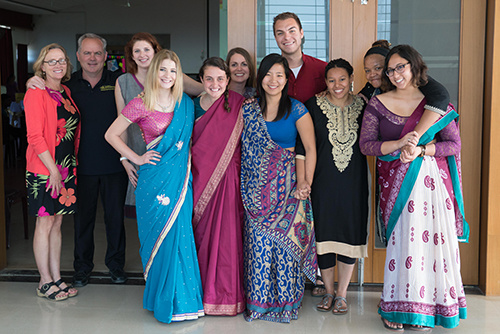
Amira Nash wants to be the best educator she can be, especially with an increasingly diverse student population in Iowa and the nation.
Having participated in the India Winterim, Nash returned to a student teaching position at Iowa City West High School, where she helped out in an English language learner social studies class. Here, she was assisting a student who had moved to Iowa from India during an activity comparing the economy and government in the U.S. during the Great Depression to those in their home countries.
“Because I had been to India, I was able to speak with the student about her country, and she was able to answer my questions about the government there,” says Nash. “We’ve had a great relationship ever since, and I’m glad I was able to make a genuine connection with her, and I was able to discuss the beauty I found in her country. After our conversation, she was beaming, and I don’t think it would have been the same had I just been asking her about her country. After our conversation, this generally shy student was confident in sharing her writing with the rest of the class during discussion.”
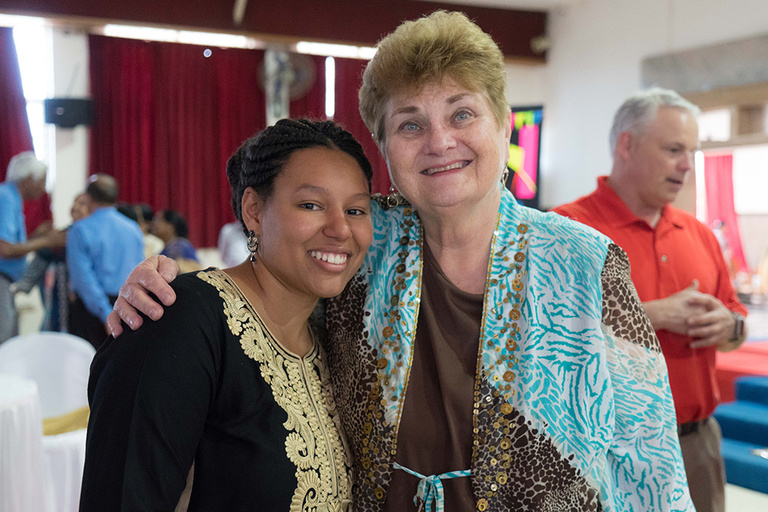
Amira Nash with Linda Baker at the Dehli Public School for their final presentations and a farewell celebration.
The India Winterim trip this year was made possible thanks to the generosity of one of the college’s most ardent supporters, Linda R. Baker (BA ‘68). Baker wants to support students such as Nash on their educational journeys to be-come the best, most culturally competent teacher leaders possible.
Thanks to Baker’s generosity, their goals coalesced perfectly. Nash was among nine University of Iowa students who traveled on the India Winterim trip to experience a drastically different learning environment in another culture.
India Winterim is an intensive, three-week field-based program that provides students with the opportunity to learn from and directly interact with leading social entrepreneurs, non-profit organizations, and academic institutions within India’s diverse cultural, socioeconomic, and geographical mosaic.
The trip broadened the horizons of these students in many meaningful ways in addition to providing them with academic credit. Taking place in January of 2017, the experience made a big impact on these future educators.
Nash, of Cedar Rapids, Iowa, will receive a BA in psychology, her teaching licensure in Social Studies Education, and her ESL certification in May 2017.
She is no stranger to international travel. Nash studied abroad in Spain her first year. The following winter, she went to India for the first time. The summer after that, she landed in Cuba during a volunteer trip through the UI Alumni Association.
During her recent India Winterim trip, Nash observed different types of classroom settings. This included schools that were private and public, as well as non-govern-mental organization schools. For Nash, seeing a variety of classrooms deepened her understanding of education in India. She says studying abroad is especially important for future teachers.
“Everyone that studies abroad usually has some life-changing experience and says how valuable the experience is,” says Nash. “But, if you bring that back as future teachers, you’re affecting so many more people because you’re affecting your whole classroom and generations of kids, who are our future.”
Nash says her study abroad experiences have opened her eyes to the idea of seeing the world from the perspectives of people outside the U.S. As for the future, she recently accepted a job teaching English Language Learners at Iowa City West High School.
“It is so valuable, and it’s so powerful to try to understand somebody else’s point of view,” says Nash.
“When you meet people and you connect with people, you’re not just a tourist. And you understand that not everybody does things the same way. But, that doesn’t mean that other ways are wrong or right. They’re just different. When you understand that, you can be a better person, honestly.”
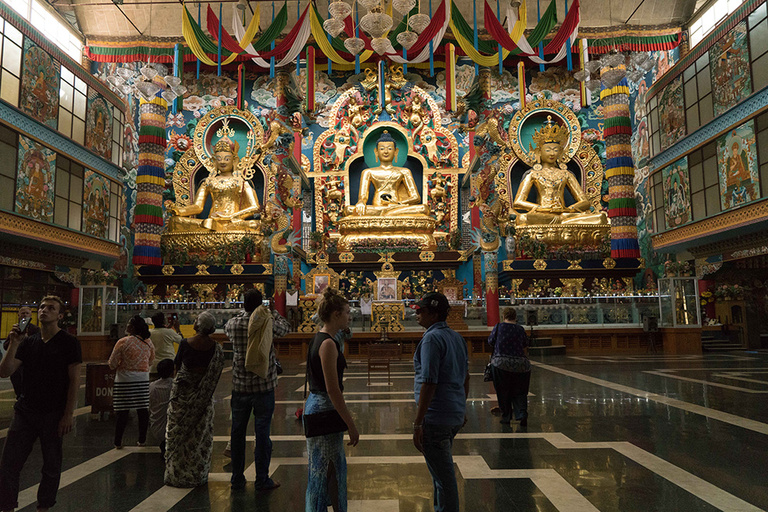
Students visiting a Buddhist temple.
Another India Winterim participant, Kate Moon, of Gallipolis, Ohio, is pursuing a Master of Arts in teaching in the science teacher education program. Moon says the trip to India enabled her to empathize with students from outside the U.S. who come to this country to learn.
Moon expressed appreciation for Baker’s support for the Winterim experience.
“I’m really thankful that Linda Baker gave us this opportunity,” Moon says. “Having this experience made me more accepting of the global community and to empathize with students from different cultures as well.”
Krista Walker, a graduate fellow in the Schools, Culture, and Society Ph.D program from Muncie, Indiana, also participated in the India experience. Prior to studying at UI, Walker was a teacher at a school in Queens, New York, where many of her students were Latino, as well as from countries in southeast Asia.
During her time in India, Walker says she began to see things from the perspective of her former students. She was in a country where the food, clothing, and cultural norms were all different. She was also able to experience a small slice of cultural adaptation, which is the time period it takes to integrate into a new culture.
Spending time in India made Walker realize the struggle that students in the U.S. who are from other countries experience every day. She acknowledges that these students not only have classwork to challenge them, but they also have U.S. cultural norms that can produce obstacles.
This revelation has influenced Walker to keep the concept of cultural adaptation in mind during her studies at the College of Education. Upon completing the Ph.D program, Walker plans to further her career in developing teacher training programs.
Walker says experiences abroad like the one she had in India are essential for all educators, especially at the onset of their careers, because it can be a life-changing endeavor.
“It’s necessary for them to have a better understanding of who their students are and their life experiences,” says Walker. “This would inevitably allow them to become better educators and provide the supports necessary to ensure their students’ success.”
Alumni make a difference
Two College of Education alumni are dedicated to helping education students become the most successful, culturally-competent educators possible.
Clinical Professor Mitchell Kelly (BA ’87/PhD ‘95) has led India Winterim trips for many years, with 2017 marking his fifth trip. Kelly led the “Observational Learning in Educational Settings in India” course. He says the experience often entirely changes students’ world views and plans to take more students to India in the future.
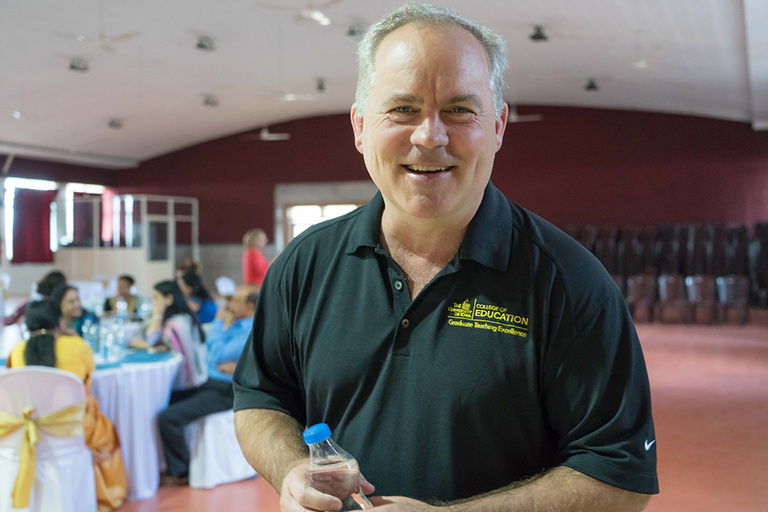
Mitch Kelly at the Dehli Public School celebration.
“I just think it broadens your perspective on everything,” says Kelly. “I want that for all of my students.”
Linda Baker has provided incredible support for the College of Education. The college’s teacher leader center, an invaluable resource of technology and professional development, was named in her honor.
Not only did Baker provide students with the financial means to participate in the trip, she also went along with them, learning all she could about education in India.
The resilience of the students participating in the India Winterim impressed Baker throughout the trip. She says they all rose to the occasion, no matter the situation. And, perhaps most importantly, did so with a smile and positive attitude.
Once in the classrooms, Baker says the UI students did not hesitate to engage with the students, showing them they were valued. Baker says the UI students demonstrated to the students in India that they were genuinely interested in them as people. She says this is the foundation of impactful teaching.
“I was very proud of them and the way they interacted with the schools’ students,” says Baker.
There is an immense value in being out of one’s element. Baker says that, for pre-service teachers, coming to a place like India where there are language, culture, and culinary differences, allows these students to adapt and grow their knowledge of teaching. When Baker talks with students who have gone on Winter-m trips, she says she can see how much they’ve grown as individuals and education professionals.
“I love to see the change and the reflectiveness they come back with,” says Baker.
More often than not, this reflectiveness allows College of Education students to be better teachers after they graduate. Experiences outside of their comfort zone allow them to be more conscientious and compassionate toward students in their classes who come from diverse backgrounds, Baker says.
“Twenty years from now, 30 years from now, they’ll sit back and they’ll think, ‘That was really a wonderful experience,’ and they’ll feel that they got something valuable out of it,” says Baker.
Student teaching abroad
Every semester, several students venture abroad to student teach in countries across the globe. These experiences broaden their understanding of the world and allow them to return to the U.S. with a wealth of experiences that enable them to be the most dynamic teachers possible.
Allison Gattone, of Libertyville, Illinois (BA ’16) spent eight weeks in fall 2016 as a student teacher in Pavia, Italy, 20 minutes south of Milan.
Gattone says that with increased numbers of students in the U.S. speaking English as a second language, it is important for her to understand that challenge. She says that by teaching in a non-English-speaking country, she has a better understanding of what it is like to experience an educational environment where her native language is foreign.
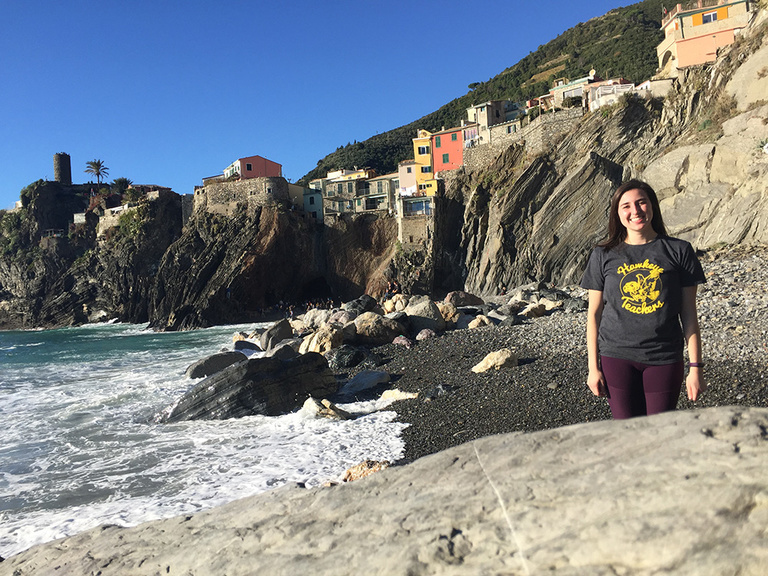
Allison Gattone at the beach in Italy.
“That’s part of what’s so rewarding,” says Gattone. “As you become more worldly, you can share lessons with students that are invaluable for them.”
As a student teacher, Gattone had the opportunity to immerse herself in the culture of Italy while teaching English, and helping fourth- and fifth-grade students learn math, history, and grammar. She spent 15 hours a week teaching English and an additional seven hours per week sitting in on students’ lessons in other subjects.
Gattone says that the teaching experience in Italy challenged her in many positive ways. For the first month she was there, the public school where she taught did not have an Internet connection. Despite this hurdle, Gattone was able to teach students using textbooks and other conventional teaching methods outside of online resources like smartboards and YouTube.
The school’s Internet connectivity returned while she was there, which allowed Gattone to also use online teaching tools. But, it was the experience of switching back and forth between older teaching methods and newer, tech-savvy ones that re-ally helped her grow as a teacher.
“We are very fortunate with the resources we have and the preparation we receive in the U.S. as teachers and training teachers, which I wasn’t aware of until I stepped out of my comfort zone,” says Gattone.
A global nexus
The college is strengthened by the inclusion of students from around the globe. These students broaden the horizons of both their fellow domestic learners and the college’s faculty. Professor Greg Hamot, coordinator of International Students and Programs at the college, says having international students in the college brings many benefits. He says international students can help U.S. students understand the value of the global interconnected-ness all students share.
“It’s a value added for the non-international students,” says Hamot.
This value is reciprocal, according to Hamot. For international students, there is immense value in the cross-cultural experience they have here.
Staying connected on a global scale is a high priority for the College of Education. The college maintains linkages, or connections, to a number of entities throughout the world, mainly universities. Linkage institutions are found in Chile, Hong Kong, Kosovo, Portugal, China, Japan, Norway, India, Indonesia, and Mexico.
“Anytime we can engage our students to do research on educational phenomenon cross-culturally is a great advantage that they have when they leave here to look for jobs,” says Hamot. “They have that global exposure.”
This is especially valuable when doctoral students are given the opportunity to do a dissertation study, which Hamot has done with many of these students throughout the years. Many of these studies have centered around emerging democracies in Eastern Europe.
“Not too many people get that opportunity when they’re going through their doctoral programs, and here we have had quite a few students over the years from all the departments who’ve been able to do that in some way, shape or form,” says Hamot.
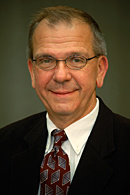
Greg Hamot
Graduate students from around the world see this as a research destination. The collaborative spirit of faculty members and supportive environment of the campus help foster innovative research from international graduate students.
Throughout her experience as a doctoral candidate in the Science Education Program, Yejun Bae, of Seoul, South Korea, she says she has felt supported by faculty.
Her research focuses on multiculturalism in science education, with specific attention paid to U.S. students who are secondary school English language learners. Although Bae is skilled in English writing, she says that graduate writing consultation at the Writing Resource has been very helpful. Because of the significant grammatical differences between Korean and English, this service has been important to her.
Bae says she’s had a lifelong interest in science education. Before coming to the U.S., she was a biology and general science teacher in South Korea for 12 years, having decided to be a science teacher in junior high. Bae plans to work in higher education in the U.S.
Bae says she has received a lot of support from faculty, particularly her advisor, Professor Brian Hand. She says he visits the graduate student office regularly and checks to see how these students are progressing in their studies. Bae says she appreciates his level of involvement.
She also credits Associate Professor Renita Schmidt with supporting her educational endeavors. Schmidt, who specializes in language, literacy and culture studies, has shown Bae and others in her Ph.D. pro-gram that anyone, regardless of their background, can become an impactful researcher in the education field.
Whether they are traveling across the world to India or Italy, students are able to transform their perspectives on education in ways that enrich their ability to teach and conduct research. International students learning here also bring value to the realm of education locally and across the globe.
“Given the extent and importance of human interconnection today, knowledge is widely available to all,” says Hamot. “Therefore, being active in the global realm of knowledge production, validation, and consumption makes the College of Education a major contributor to the improvement of the human condition.”